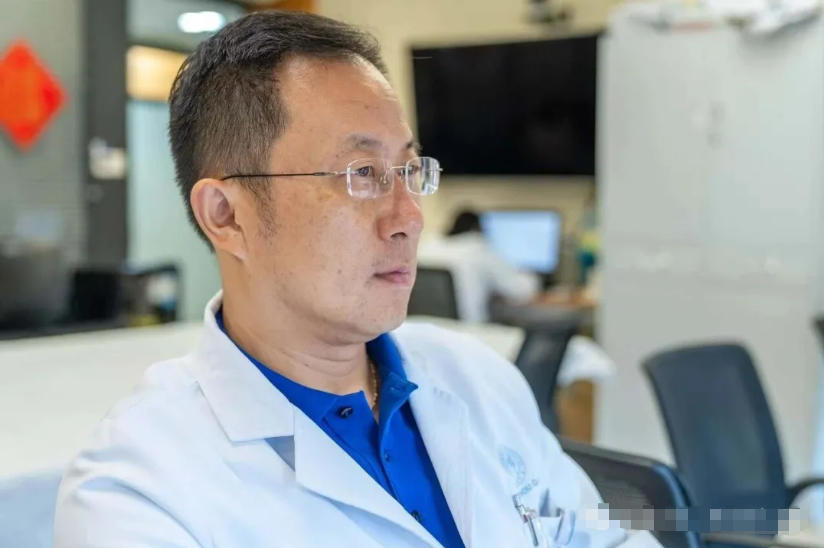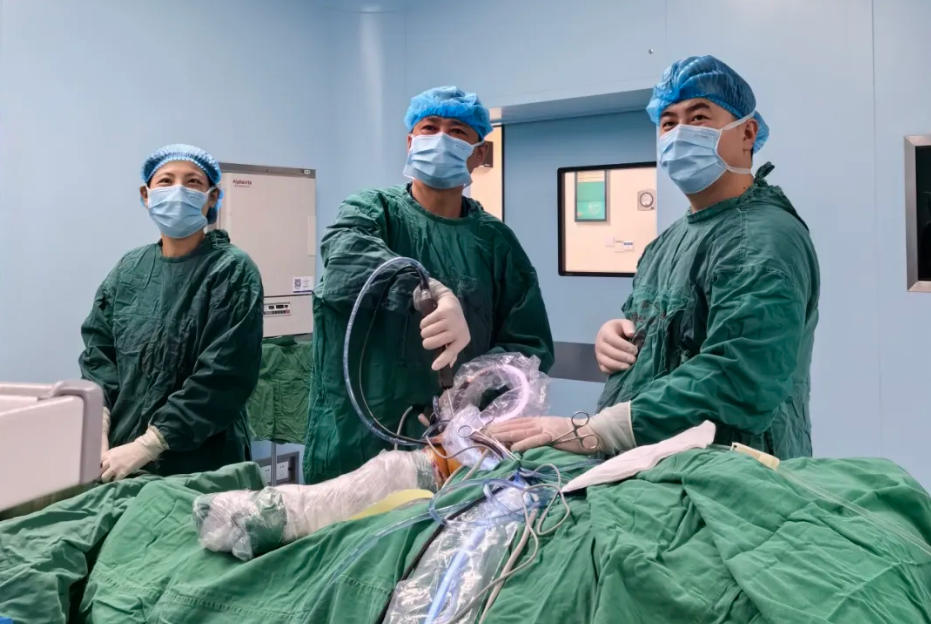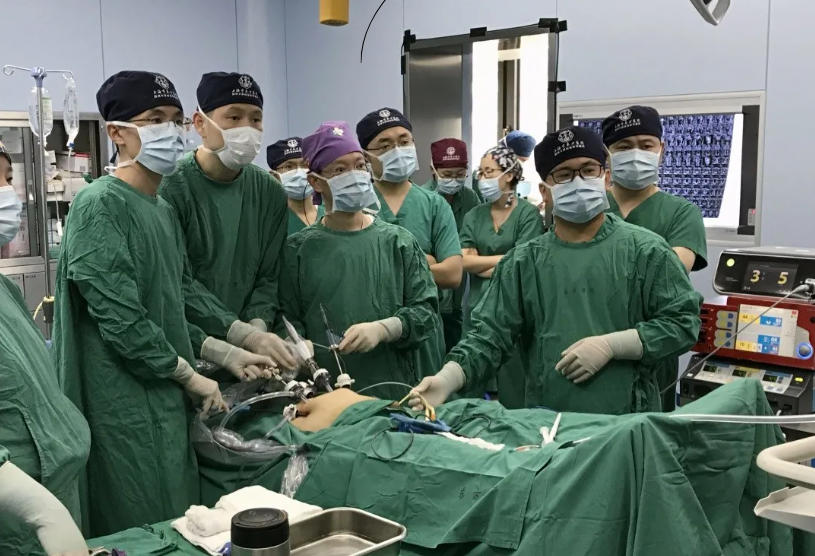Update time:2025-10-20Visits:3362

Shen Nan, full professor in Rheumatology and Autoimmunology, serves as the Director of the Shanghai Institute of Rheumatology and the Director of the Shanghai Clinical Medical Center for Autoimmune Diseases.
Introduction
For over 40 years, the Department of Rheumatology at Renji Hospital has evolved from a small team of three into one of China’s most distinguished departments, renowned for treating complex autoimmune diseases like lupus.
Building on the foundation laid by pioneers like Chen Shunle and Gu Yueying, and through the dedication of successive generations, the department has emerged as a national leader.
Shen Nan is a leading figure of this new generation. Connecting the department’s past with its future, he has dedicated his entire career to Renji, consistently achieving new milestones. At Renji, he developed a profound respect for life and, driven by a desire to excel and a fearless curiosity, has pioneered new frontiers in medicine.
The Path to Medicine
Medicine is a complex and respected field, embodying the power to preserve life and the universal pursuit of health.
Born in Shanghai to a family of doctors, Shen Nan was immersed in the medical world from an early age. However, he was not limited by traditional medical concepts. In middle school, he developed a strong interest in science.
“At that time, I aspired to be a scientist, particularly admiring Einstein,” Shen Nan recalls. “I believed that scientific exploration was the best way to satisfy my curiosity about the unknown. A future spent answering unanswered questions seemed like a fulfilling life.”
When it came time to choose a major, Shen Nan enrolled in clinical medicine at Shanghai Second Medical University. There, he recognized that medicine is an integration of experience, philosophy, science, and the humanities. He saw that its evolution from an empirical art to a precise science required logic and rigor. He realized that the future of medicine depended on scientific exploration to find answers.
Shen Nan began to envision a path as a clinician-scientist, not just a clinician. He firmly believed this was feasible because while clinical experience could solve many problems, understanding the underlying mechanisms was essential for achieving true cures.
Therefore, Shen Nan resolved to delve into the mechanisms of disease, seeking scientific truths through in-depth research and experimentation.
“At that time, medicine and basic research were not yet closely integrated,” he notes. “Most graduates focused solely on clinical work. As new technologies emerged, I gradually realized that medicine’s progress is impossible without scientific support.”
Shen Nan began his internship at Renji Hospital, where he was deeply impressed by its rigorous and understated atmosphere. This rigor extended beyond medical skills to a strong emphasis on medical ethics. He has remained at this institution ever since.
“Renji Hospital has always had a prestigious reputation and excellent medical standards. For medical students, interning here meant facing a rigorous education, and that was my experience.”
After graduation, Shen Nan decided to pursue graduate studies in immunology, a choice inspired by Professor Chen Shunle, whom he met during his undergraduate studies.
“The senior professors at Renji are a treasure of the hospital,” Shen Nan says. “They allowed us interns to constantly experience and inherit Renji’s traditions. Behind the rigor of medical education lies the principle of putting patients first.” Professor Chen Shunle not only taught rheumatology but also shared extensive knowledge of immunology, using it to explain disease etiology. This sparked Shen Nan’s curiosity and exploratory spirit, making him realize the vast unknowns in medical research.
“Professor Chen Shunle is a leading figure in Chinese rheumatology, having pioneered many new developments in lupus research. I felt it would be a great honor to be accepted as his graduate student.”
Shen Nan was successfully admitted to Professor Chen’s graduate program. The professor’s scholarly spirit and philosophy had a profound influence on him, and Shen Nan saw in him the clinician-scientist he had aspired to become.
“He possesses sharp scientific thinking and insight, able to grasp the core issues in clinical research,” Shen Nan says. “His forward-thinking perspective on the relationship between scientific development and disease progression benefited me greatly. He became a beacon for my later work.” He also credits Professor Gu Yueying’s pragmatic spirit for enabling the department’s clinical and basic research to proceed smoothly and achieve success.
“For me, the senior professors were a guiding light,” Shen Nan reflects. “Looking back, Professor Chen offered unique perspectives on how to approach problems that were very insightful and far-sighted.”

Inheriting a Legacy, Undertaking a New Mission
“I feel that Renji Hospital’s cultural atmosphere aligns well with me,” Shen Nan says. “I appreciate a rigorous approach, which resonates with Renji’s emphasis on precision and understatement. This suits my professional development well.”
In Shen Nan’s view, Renji Hospital has a comprehensive training system for young doctors, with leaders at all levels prioritizing talent development and maintaining the department’s traditional advantages in research.
The Department of Rheumatology fosters an inclusive and open environment where various talents can thrive. Young doctors can engage in intense discussions while feeling free to express their ideas. This respect for individual development promotes the overall progress of the hospital, creating a unique academic atmosphere.
Shen Nan has studied and trained in different institutes, experiences he found valuable. He believes Renji’s tradition of international engagement aligns with Shanghai’s international and open spirit, which promotes knowledge exchange and frequent communication.
“Our senior professors all have excellent traditions of international exchange,” Shen Nan notes. “Unlike many other institutions in China, Renji emphasizes equal, peer-to-peer international exchange, which is more important. Professor Chen Shunle gained international recognition and was invited by renowned institutions worldwide, which allowed our department to grow faster.”
In Shen Nan’s opinion, without these traditions, the department would not have achieved its current success.
Renji Hospital was one of the first in China to establish a department of rheumatology. The beginning was not easy. In the early days, Professors Chen Shunle and Gu Yueying led a team of only three people with just five hospital beds. Facing enormous challenges, they laid a solid foundation for the discipline’s development.
The department’s growth has been a journey of more than forty years, progressing through four distinct stages.
In the first stage, Renji established China’s first rheumatology department. The small team conducted large-scale epidemiological surveys, revealing for the first time the prevalence of systemic lupus erythematosus (SLE) in China and making breakthroughs in diagnostic criteria and autoantibody research. They also developed treatment protocols for lupus complications that gained international recognition.
“Professor Chen Shunle and Gu Yueying once organized and led the world’s largest epidemiological research project on lupus,” Shen Nan explains. The study of 33,668 Shanghai textile workers revealed a lupus prevalence of 70 per 100,000 people, and 113 per 100,000 among women—a ratio of approximately 1 in 1,000. These findings were significant for understanding the disease’s epidemiology in China.
Another major achievement from this stage was the development of PMC therapy. Professor Chen improved the conventional SLE treatment of “hormones (P) + chloroquine ©” by introducing methotrexate (M), creating “PMC therapy.” This approach significantly reduced hormone dosages, effectively controlled mild to moderate lupus, and lowered the incidence of infections and other complications. The low-cost therapy earned the First Prize of the Shanghai Science and Technology Progress Award in 2005.
“During this stage, under Professor Chen’s leadership, we laid a solid foundation for our department, and the survival rate of our patients improved significantly.”
In the second stage, the department began exploring the mechanisms of lupus, focusing on its genetics and functional genomics. They discovered key therapeutic pathways, particularly the link between type I interferon activation and the disease, providing a foundation for targeted therapies.
In the third stage, the department pioneered a new field, believing lupus pathogenesis is also related to the dysregulation of epigenetic mechanisms. They focused on the role of non-coding RNA in immune cells, discovering its important regulatory function in lupus. This research was at the international forefront and provided new ideas for diagnosis and treatment.
During this stage, Shen Nan published a series of papers in influential international journals and was invited to write a review in the top journal Nature Reviews, enhancing the department’s international academic reputation. His research contributions earned him numerous domestic and international awards.
Furthermore, Shen Nan is a prominent figure in the academic community, frequently invited to speak at major domestic and international conferences.
“I feel very honored to represent China at these conferences,” he says. “It allows them to understand the situation of lupus in China, and it gives me the chance to learn from international peers, bringing hope to our patients.”
In the fourth stage, the department established the “Sino-Australian Joint Research Center for Personalized Immunology” to focus on innovative research. They have discovered many rare gene mutations associated with lupus, revealing new pathogenic pathways. The team is also conducting research in gene editing and stem cell interventions, aiming to translate cutting-edge scientific findings into future clinical treatments and build a world-class research team.
New Frontiers in Research and Public Engagement
Building on its strong foundation, the department established the Shanghai Clinical Medical Center for Autoimmune Diseases, with Shen Nan serving as its director. The center’s key projects include establishing China’s most comprehensive biobank for rheumatic and immune diseases and creating a dedicated lupus database.
As the first disease-specific biobank of its kind in China, it leads the nation in standardized development through rigorous management and processing protocols. Championed by the China Medicinal Biotechnology Association, the biobank led the creation of national group standards for collecting, processing, and preserving biological samples for rheumatic diseases. This initiative established consistent national standards and created a foundation for sample and data sharing between institutions. The biobank prioritizes long-term follow-up cohort samples, which constitute over half of its collection, making it the largest repository of its kind in China. This focus transforms it from a static repository into a dynamic research platform capable of tracking disease progression. To support translational research, the biobank has distributed over 10,000 samples for more than ten research projects, leading to numerous publications and patents. This success has created a model for research and translational medicine in the field.
The team also developed a specialized database for systemic lupus erythematosus (SLE). Based on the disease’s clinical characteristics, this bilingual, standardized cohort database meets the highest international standards and covers the entire clinical process, from diagnosis to treatment and research. It is the first of its kind in China, creating a structured dataset for SLE clinical research. This structured dataset allows for the efficient and compatible collection of SLE-specific data, facilitating sharing and integration between institutions and studies in the era of big data. Since its launch, the platform has supported high-quality clinical research and promoted standardized diagnosis, treatment, and management of SLE across China.
“Overseeing the Autoimmune Research Center is one of my key responsibilities,” Shen Nan states. “Each developmental stage has been a critical milestone for our department, building a wealth of experience and yielding significant research. These achievements lay the groundwork for the precision treatment of lupus and are expected to form the basis for future drug targets and diagnostic kits. Our goal is to translate cutting-edge research into clinical practice, offering patients more precise and individualized treatment plans. This is the direction we are committed to pursuing.”
Shen Nan believes that while generations of effort have allowed Renji Hospital to close the gap with international standards in rheumatology and immunology—especially in basic research—a significant gap remains in translational research. This is the area he is determined to address.
“As a physician-researcher, I’ve noticed a challenge in our field: while we generate many patents, there’s relatively little domestic research on new drugs,” Shen Nan observes. “This is a broader issue in medical development. We are focused on this problem, committed to translating our research into tangible products and therapies. We are actively working to bridge the gap in translational research, with the goal of developing new diagnostic reagents and drugs. These outcomes are a key focus of our work and are highly anticipated by both the hospital and our patients. We want to provide better medical solutions and improve their quality of life through research and practice.”
Shen Nan and his team have a clear vision for the future.
“Current treatments primarily involve targeted drugs or symptomatic relief, addressing the disease’s effects rather than its root cause,” he explains. “To achieve a true cure, we need revolutionary progress. We have proposed the concept of ‘resetting the immune system.’ Achieving this will require novel approaches like cell and gene therapy, along with treatments that target the disease’s underlying mechanisms. These are the directions we are actively pursuing.”
In Shen Nan’s vision, future therapies could reconstruct damaged tissues or organs using stem cells or other specialized cells, restoring their normal function. He also believes gene therapy could intervene to repair abnormal genes, correcting defects at the cellular and tissue level.
“To use these therapies to fundamentally cure diseases, we must first understand pathogenesis more deeply, blocking disease development at its root. This requires studying physiological and pathological processes from a molecular biology perspective to find intervention targets, reset the immune system, and develop corresponding treatment strategies.”
As a physician-scientist who has significantly advanced lupus research, Shen Nan has revealed disease mechanisms, discovered new therapeutic pathways, and laid the groundwork for precision treatment. Moving forward, his team will focus on strengthening the collaboration between clinical practice and scientific research. They are committed to exploring revolutionary new treatments and driving the continued growth of the Department of Rheumatology at Renji Hospital.
As a member of the Science Popularization Committee, Shen Nan’s department has published magazines on lupus and arthritis. With outreach methods shifting online, he hopes his team will expand its efforts in science communication.

“Patient participation is essential for both treatment and research, and that requires compliance,” Shen Nan notes. “Compliance is achieved not just through prescriptions, but through patient education. While some patients with higher education may more easily grasp treatment plans, we must educate all patients on fundamental concepts. Explaining the complex immunological principles behind a drug’s use can be difficult, but understanding the ‘why’ helps patients overcome fear and makes our communication smoother.”
Shen Nan envisions accomplishing this through patient-focused events and a mix of online and offline promotional activities.
“As committee members, we can leverage various media channels—including the internet, social media, and traditional media—to disseminate scientific knowledge to a wider patient audience. Through effective science communication, we can help patients better manage their conditions and improve their health literacy.”
Through his research, Shen Nan has revealed the essence of diseases and therapeutic mechanisms, discovered new treatment pathways, and laid a solid foundation for the precision treatment of lupus. An influential figure in academic circles, he actively participates in international exchanges and cultivates independent thinking and innovation in his students. By translating research into tangible clinical solutions, he improves the precision and individualization of patient care. Committed to exploring revolutionary therapies, his leadership will guide the Department of Rheumatology at Renji Hospital toward a future of continued innovation and new breakthroughs.
Editor: Chen Qing @ ShanghaiDoctor.cn
If you'd like to contact Doctor Shen, please be free to let us know at chenqing@ShanghaiDoctor.cn.
Note: Chinese Sources from “The Path of Benevolent Medicine” which was published in 2024. It records 90 important medical figures in the history of Renji Hospital. Yewen Renyi (ShanghaiDoctor.cn) team was one of the major writers of the book and is authorized by Renji hospital to create English version on the website of ShanghaiDoctor.cn
Hospital: Renji Hospital, Shanghai Jiao Tong University School of Medicine
Dr. Zhou Qianjun | “Sculpting Life in the Chest” – A Portrait” – A Portrait
Dr. Cai Junfeng | Guarding Bone and Joint Health, Improving Quality of Life
Dr. Xu Xiaosheng|The Gentle Resilience of a Male Gynecologist
Dr. Shi Hongyu | A Cardiologist with Precision and Compassion
Dr. Zhang Guiyun|The Inspiring Path of a Lifesaving Physician
Dr. Chen Bin | Building the Future of ENT Surgery at Lingang,Shanghai
Prof. Zhang Baigen | The Oral History of China’s Vascular Surgery

Dr. Zhou Qianjun | “Sculpting Life in the Chest” – A Portrait” – A Portrait

Dr. Cai Junfeng | Guarding Bone and Joint Health, Improving Quality of Life

Dr. Cui Xingang | The Medical Dream of a Shanghai Urologist

Dr. Xu Xiaosheng|The Gentle Resilience of a Male Gynecologist

Dr. Shi Hongyu | A Cardiologist with Precision and Compassion

Dr. Zhang Guiyun|The Inspiring Path of a Lifesaving Physician

Dr. Jiang Hong | Bringing Hope to Vascular Frontiers

Dr. Huang Jia | A Journey of Healing "Breath"

Dr. Chen Bin | Building the Future of ENT Surgery at Lingang,Shanghai

Prof. Zhang Baigen | The Oral History of China’s Vascular Surgery